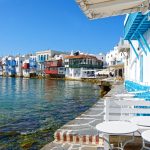Socialising is more than a pastime in Greece – it’s a way of life. Cafes overflow with youngsters gossiping or older locals in heated debate. Restaurants are filled with long tables for big gatherings and friends amble arm in arm down the street. Squares are the focal point, where life unfolds collectively. Immerse yourself, whether it’s a coffee, a shot of ouzo, a chorus on the bouzouki or a local celebration. Greeks are passionate and live life to the fullest, even at the most difficult times. The result is a country seemingly riddled with challenges, yet full of people loving life.
Money
The monetary unit in Greece is the Euro (EUR). 1 Euro = 100 Euro cents.
You should always carry some backup cash or traveller’s cheques separate to the rest of your money and cards. So if you loose your wallet or handbag, you have enough back up money to at least make some phone calls and eat for a few days.
Euro is the currency of Greece since 1 January 2001. Credit Cards and Travellers Cheques are widely accepted in major cities and tourist resorts. ATM’s are also accessible at all our destinations and offer the best exchange rate. A mixture of debit, credit cards and cash are the best forms of currency.
It is difficult for us to specify the money that you will spend per day, however, as a general rule EUR 34 to EUR 67 per day can provide you with additional meals and optional entrances. Should you wish to purchase souvenirs or other luxuries, of which there is a diverse range, you will have to budget for these.
Eating and Drinking
Its unique tastes are some of the things that set Greece apart. You are in for pleasant culinary surprises while in this country. Contrary to common belief you will soon discover that Greek cuisine does not solely consist of mousaka, souvlaki and horiatiki salata. Greek cuisine has a great variety of dishes and can be an extremely satisfying culinary adventure for both meat-eaters and vegetarians. We always recommend drinking bottled water.
Greek cuisine is a Mediterranean cuisine, sharing characteristics with the cuisines of Italy, the Balkans, Turkey, and the Levant. Contemporary Greek cookery makes wide use of olive oil, vegetables and herbs, grains and bread, wine, fish, and various meats, including poultry, rabbit and pork. Also important are olives, cheese, eggplant (aubergine), courgette, and yoghurt. Greek desserts are characterized by the dominant use of nuts and honey. Some dishes use filo pastry.
Mezes is a collective name for a variety of small dishes, typically served with wines or anise-flavored liqueurs as ouzo or homemade tsipouro. Orektika is the formal name for appetizers and is often used as a reference to eating a first course of a cuisine other than Greek cuisine. Dips are served with bread loaf or pita bread. In some regions, dried bread (paximadhi) is softened in water.
The national drink is Ouzo. Ouzo, an 80-proof clear alcoholic beverage that is flavored with anise; it turns milky white with water or ice; the best said to be produced on the island of Lesbos.
Tipping
Tips are commonplace for table service in Greece. Restaurants and taxis, local markets and basic restaurants – leave the loose change. More up-market restaurants we suggest 5% to 10% of your bill. If you think you tour leader has worked hard then s/he will appreciate a tip of a few Euros. You do not need to tip the service staff at the hotels.
Australia Government Travel Advice
The Australian Government provides up to date information on the safety of travelling to various countries, and all travellers should take note of this advice. Liberty Tours recommends that all travellers take out appropriate Travel Insurance to cover the entire duration of their absence from home.
Follow this link for current official assessment:
https://www.smartraveller.gov.au/destinations/europe/greece
Advice on health risks and vaccination recommendations can also be found using the same link.
Weather
The climate of Greece is Mediterranean on coasts and islands, with mild, rainy winters and hot, sunny summers. The northern cities, located in the inland areas of Epirus, Macedonia and Thessaly, have a slightly continental climate, with quite cold winters, during which air masses coming from the north can sometimes bring snow and frost, and hot summers, sometimes scorching. Finally, in the northern mountainous areas, winters are cold and snowy, while summers are mild, with possible afternoon thunderstorms.
What to pack
In winter: in inland and mountainous areas: bring warm clothes, such as a down jacket, a hat, gloves, a scarf. In Athens and in central and northern coastal areas: bring warm clothes, such as a sweater, a jacket, a raincoat or umbrella. In Crete and on the southern islands: clothes for spring and autumn, a sweater, a jacket, a raincoat or umbrella.
In summer: bring light clothing, sunglasses, sunscreen, a light scarf and a sweatshirt for the evening, especially on the islands of the Aegean Sea, where the Meltemi blows. In the mountains, you can bring a sweater, a jacket, hiking shoes, a raincoat or umbrella.






